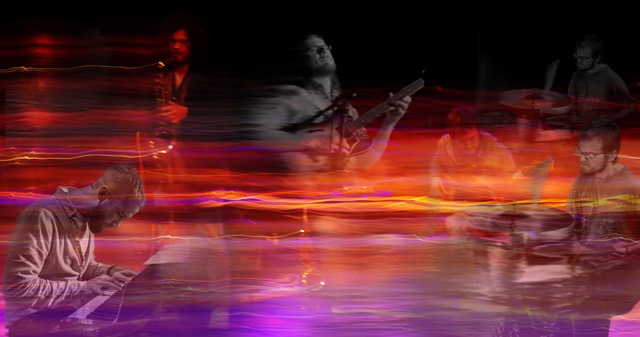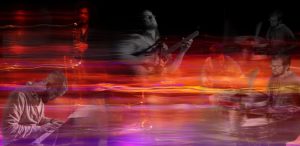Mercury began life as a quartet, formed by award winning saxophonist and composer Tom Thorp. Their 2013 debut album saw them shortlisted for the coveted Peter Whittingham award, which celebrates innovation within the field of jazz and boasts Soweto Kinch and Roller Trio among it’s previous winners. With the recording of their latest album Sea Speak, they have expanded to a quintet and further progressed their sound. With a headline tour and appearances at Manchester Jazz Festival under their belt, they continue to establish themselves as an engaging live act, with the Birmingham Press commenting; “Each of their numbers progresses with a logical unveiling of its musical matter, carefully articulated.”
Ahead of their their two-part album tour, which sees them playing live at Band on the Wall on 4th October, we spoke to saxophonist and bandleader Tom Thorp about the band’s formation, the recording of their latest album and his thoughts on music coming out of Manchester.
How did you form the group and establish it’s musical direction?
I first formed the band when I was at RNCM. We did a little spotlight performance as a warm up for Robert Glasper trio. I’d had a quartet before that, very much in the acoustic jazz tradition. I thought hard about what music I loved. I love jazz obviously, but I’m also a classically trained composer, I love indie music, 90s grunge and the psychedelic music of the 60s. I thought I’d write some stuff to reflect that.
By the time we had our first proper gig at Manchester Jazz Festival in 2012, that sound had been honed and started to settle not just into the compositions but the improvising too. After that gig it all kicked off. We were offered a gig at Kings Place, London, by their program director on the spot, right after leaving the stage. We recorded the first album Mercury:[LP] a few months later and then did the first tour. That direction we set off in at the start is still very much with us. I try and keep in mind that first record every time we work on new stuff – and the process we went through to get to it. We’re very attached to the first album.
You draw inspiration from a wide range of music, who are the key artists that you recognise as having influenced your playing or composition?
Ok so, the big ones that really kicked the whole sound of the band off in my head back in the beginning were the Chris Potter Underground quartet, Mathias Eick and Bonobo. But a lot of Jimi Hendrix too. Before writing the new album I was listening to a lot of Ben Wendel, particularly his stuff with Kneebody and his album Frame. But I also had The Beatle’s Revolver in mind a lot too.
You’ve expanded from a quartet to quintet with the release of your new album Sea Speak. What inspired the change and how has it developed the music?
Well getting Rich [Jones] on board was great because we were at college together and have been playing together a long time. But we wanted this album to develop more of the compositional elements of the last one. It gives us more textural possibilities, and more room for the guitar to be a rhythmic element, as well as freeing both instruments up to add different colours. The tracks Atlas and Phalanx are good examples of that.
You recorded Sea Speak at Giant Wafer studios; what are the objectives when recording with the band, and how much experimentation goes on in the studio?
Well, there are elements of this album which are very through composed and that we had thought about quite a bit before we recorded. But there are elements – in fact whole tracks – which came about during our time at Giant Wafer, and actually pushed other compositions off the album, because they turned out to be just right! We spent three days at Giant Wafer, eating, sleeping and writing there. It’s a fantastic studio and was for me personally, certainly the most pleasant time I’ve ever spent recording. We were able to really take our time and think about how we wanted every track to work.
Your guitarist Thomas Dibb plays with Noah’s Ark, who recorded a fantastic Sessions of March session last year. What are your thoughts on music coming out of Manchester and the collaborations which seem to extend beyond genres into multiple projects?
Manchester is one of the best cities in the world at producing independent music. Right back to Charles Halle, there’s been an ambition and an attitude of “let’s make it happen” around music making. I think there’s never been such a vibrant jazz scene as there is right now and because of the way the city works, those musicians are busy working in a huge variety of other styles. It’s not too big, so it’s not bursting with specialist venues like London. So we diversify, bump into musicians from all over the spectrum and it all crashes together. It’s fantastic.
What can we expect from your Band on the Wall show?
While we have some intricate compositions, we also love to create spontaneity. A lot of the tunes develop gradually, adding layers, taking them away, building textures through improvisation as well as composed material. So there’s always a fresh sound to each tune, they can end up going in a completely different direction than the records, and we love to play like that. I suppose there will be moments of subtlety and melody, but there will some shamelessly gritty, very un-jazzy energy, unpredictability and hopefully a real sense of all those different styles of music we’re drawing on being clear to pick out within the sound.



